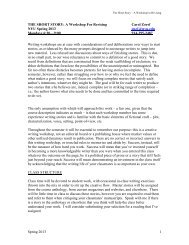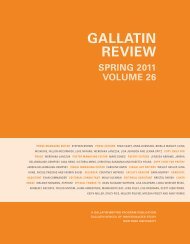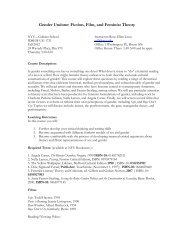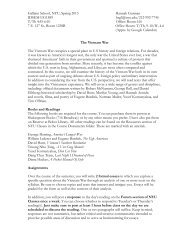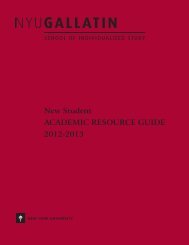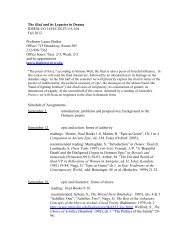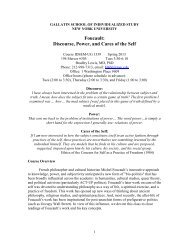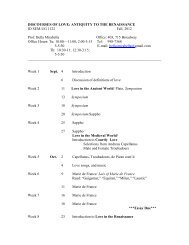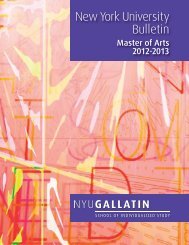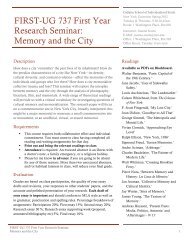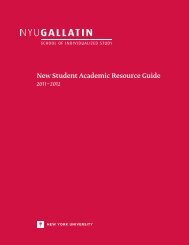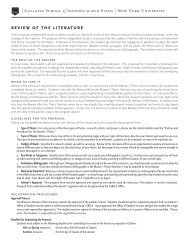New Student ACADEMIC RESOURCE GUIDE 2013-2014
New Student ACADEMIC RESOURCE GUIDE 2013-2014
New Student ACADEMIC RESOURCE GUIDE 2013-2014
Create successful ePaper yourself
Turn your PDF publications into a flip-book with our unique Google optimized e-Paper software.
Developing Your “Plan of Study”<br />
At Gallatin, we use the term “Plan of Study” in two<br />
different ways. Broadly, it refers to your “concentration”—<br />
the array of courses, independent studies, internships and<br />
other learning experiences that you and your adviser shape<br />
into your own individualized program. In this sense, every<br />
Gallatin student’s plan of study is unique. Second, and<br />
more specifically, the “Plan of Study” is the registration<br />
form that you will complete every semester.<br />
With few requirements and a wide range of opportunities,<br />
Gallatin allows its students a great deal of autonomy in<br />
developing their concentrations. With their advisers’<br />
help, Gallatin students design concentrations that take<br />
into account their unique backgrounds, interests and<br />
goals. These individualized programs typically combine<br />
Gallatin courses with classes in other NYU schools, as<br />
well as independent studies and internships. As you plan<br />
your program each semester, your adviser will assist you in<br />
making informed academic choices while supporting you<br />
as you take responsibility for your own education.<br />
Each semester, you will be asked to articulate your<br />
educational goals and plans for realizing them by filling<br />
out a “Plan of Study” form, listing your proposed courses<br />
for the semester and writing a thoughtful description of<br />
your short- and long-term academic goals.<br />
Along the way, be sure to familiarize yourself with the<br />
NYU lingo. For example, while some universities calculate<br />
a student’s courseload in “credits” or “points,” NYU does<br />
so in “units.” Most NYU courses are 4 units each, and the<br />
average load is four courses (16 units) per semester.<br />
Remember your Gallatin requirements. As a Gallatin<br />
student, your goal is to develop your interests and build a<br />
concentration while simultaneously fulfilling the Core and<br />
Foundation requirements. (See page 9 for details.)<br />
The Role of the Adviser<br />
Strong academic advising will be a key component of<br />
your Gallatin education. Two advisers in particular—your<br />
primary adviser and your class adviser—will help you<br />
construct your program of individualized study.<br />
Your primary adviser will help you develop a concentration<br />
each semester. He or she may supervise your independent<br />
studies and internships. In your junior and senior years,<br />
your primary adviser will help you conceptualize and plan<br />
for your Colloquium—the student-designed oral exam<br />
that serves as the capstone requirement for every Gallatin<br />
undergraduate student.<br />
Whether you are a first-year or transfer student, you will<br />
be assigned to a primary adviser in your area of academic<br />
interest. Should your area of interest change, you will be<br />
able to switch advisers in a future semester.<br />
Your class adviser supports both you and your primary<br />
adviser, answering administrative questions you have and<br />
helping you navigate NYU’s systems. If your primary<br />
adviser is temporarily unavailable, your class adviser will<br />
help answer your substantive academic questions. In short,<br />
both the primary and class advisers work to ensure that<br />
your program not only has depth, breadth and coherence<br />
but also is consistent with your educational and career<br />
goals.<br />
NOTE: Your Gallatin advisers are academic advisers. If<br />
you have questions about non-academic issues such as<br />
tuition, financial aid or housing, you should contact the<br />
appropriate NYU office. (See page 15 for a list of these.)<br />
If you still have trouble finding answers to these nonacademic<br />
questions, you should contact Gallatin’s Office of<br />
<strong>Student</strong> Services at (212) 998-7378 for assistance.<br />
Information Just for First-Year<br />
<strong>Student</strong>s: The First Semester<br />
We do not expect you to be able to explain your<br />
concentration in your first semester. Indeed, you should<br />
use your entire first year to explore some of the many<br />
intellectual opportunities that NYU has to offer. Keep<br />
an open mind as you talk with faculty, advisers and<br />
other Gallatin students and as you peruse NYU’s course<br />
offerings. This process may help you discover a subject you<br />
want to pursue in greater depth.<br />
First-Year Interdisciplinary Seminar: All Gallatin<br />
freshmen must take one of the First-Year Interdisciplinary<br />
Seminars in the fall semester. These courses are<br />
intended to introduce students to the goals, methods<br />
and philosophy of university education and to the<br />
interdisciplinary, individualized approach of Gallatin.<br />
First-Year Writing Seminar: All students must take a<br />
First-Year Writing Seminar in the fall semester and a First-<br />
Year Research Seminar in the spring. NOTE: A score of 4 or<br />
higher on the English Literature Advanced Placement (AP)<br />
exam gives you 4 units towards the 128 units needed to<br />
graduate, but does not exempt you from taking Gallatin’s<br />
writing seminars.<br />
Descriptions of all First-Year courses in the Fall semester<br />
can be found on our website at: www.gallatin.nyu.edu/<br />
academics/courses.html (filter by Year, Semester, and Course<br />
Type).<br />
2<br />
NYU GALLATIN SCHOOL OF INDIVIDUALIZED STUDY



